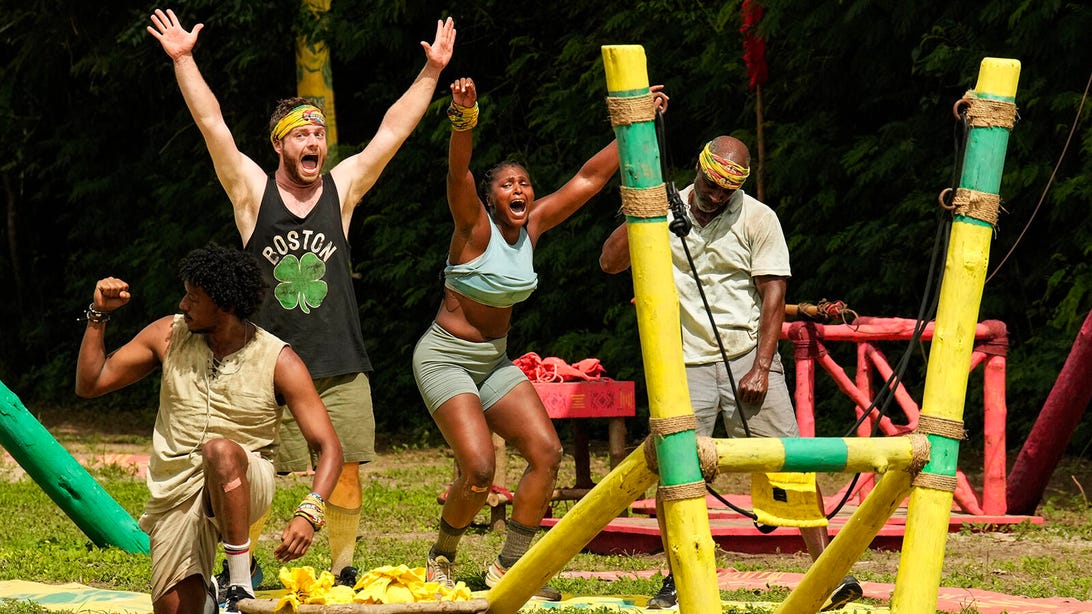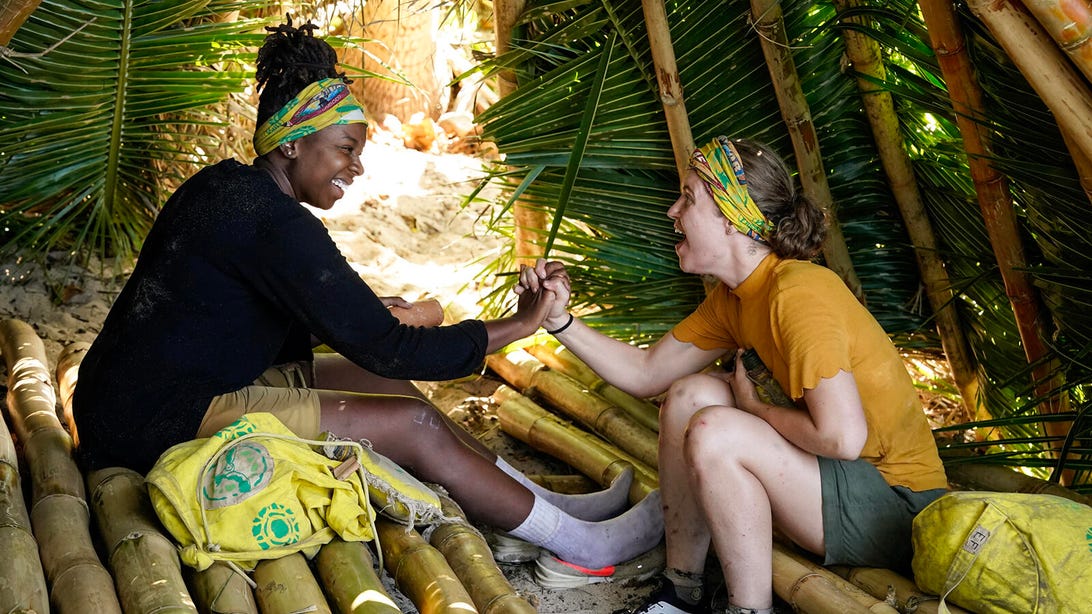Join or Sign In
Sign in to customize your TV listings
By joining TV Guide, you agree to our Terms of Use and acknowledge the data practices in our Privacy Policy.
Survivor 45 Is Using Its 90-Minute Episodes for Good
The new season benefits from spending more time with the players

Kaleb Gebrewold, Jake O'Kane, Katurah Topps, and Bruce Perreault, Survivor
Robert Voets/CBSWell folks, we made it to mergatory. It's been a long five episodes of Survivor 45 — and I mean that literally, because this fall's move to 90-minute episodes makes these the longest first five episodes of all time. But public opinion about the new season remains divided. To some, the unusually high pre-merge quit count points to a problem in the casting department. To others, there's a lot of joy to be found in the delightful ill-preparedness of a young and inexperienced cast, one sixth of whom are lawyers.
At this point in Survivor's 23-year run, there remains intense disagreement about what we should expect from the show. Gone are the days when surviving off the land felt central, though the production still pays homage to the idea by depriving tribes of rice and imposing strict (mostly pointless) flint penalties. Gone are many of the most interesting challenges, from food competitions to games testing knowledge of the fellow castaways. Gone are the shifting locations that showcased different cultures and climates. Gone, above all, is the 39-day game — replaced during COVID-19 with a truncated 26-day version that persists for largely cost-cutting reasons. That change was, and remains, the most difficult to swallow: With the game a third shorter, relationships have less time to deepen, tensions have less time to fester, and there's much less free time to bond and strategize and explore and ruminate. The pace of the game is faster now, which doesn't automatically translate to better television.
The "new era," which began with Season 41 following an all-winners season, had a bumpy start: Convoluted advantages seemed to reign supreme even more than usual, and commendable new diversity initiatives didn't completely solve the show's recent casting issues (for one, the relative lack of quality villains). But there was lots of promise here still, especially in Season 44, a season that won many viewers back largely thanks to the lovable "Tika 3" — a rare alliance that never fully turned on one another during a period in Survivor when openness and loyalty are often treated as weaknesses. And while executive producer Jeff Probst has occasionally reacted to the endless deluge of viewer complaints by digging his heels in, there were hints at a willingness to listen — even just by nixing some of the most egregious features of the new era, like the Hourglass advantage and the Do or Die twist.
Survivor 45 has continued this trend: reintroducing the opening title sequence and pre-merge tribe swap, and dialing down the unnecessary "backstory" segments. (Probst has also confirmed the return of the Survivor auction, a favorite among fans.) But it's the move to 90-minute episodes that might make Season 45 feel like the most fully told story of the new era, when all is said and done.
I came into it with low expectations. When the new length was announced, my first reaction was, But still only 26 days? There's something counterintuitive about both shortening the game and lengthening the episodes in the span of only two years. I worried, too, that the show would use the extra time for evil — by piling on more complications, rather than fleshing out the tribe dynamics. After all, this season was filmed with the knowledge that the editors had more time to work with. It was an open question how exactly CBS would allocate that time.
I won't argue that the shift doesn't affect the internal momentum of each episode; 90 minutes with ads definitely feels noticeably longer than 60, and it can feel odd when Jeff doesn't appear until 50 minutes into an episode. Sometimes pre-tribal council strategizing is too straightforward to justify more than a few minutes of screen time, and showing more even risks spoiling the eventual vote. Take last week's episode, when Emily Flippen — this season's breakout star, and one of the two remaining veterans of the original Lulu tribe — was forced to choose between trusting two former Belos (Brando Meyer and Kendra McQuarrie) and two former Rebas (Drew Basile and Austin Li Coon). A typical episode might let us believe Emily really fell for Brando's lies, but this time we see her hash out most of the miscommunications with Drew and Austin, her true allies. Brando's vote-out feels all but inevitable as a result.
Still, I can put up with some over-explained advantages and game-talk that drags on a tad long. It's worth it for the relative clarity, something sorely missing from other recent seasons. At basically every point during this pre-merge, I've had at least a solid general grasp of the various alliances and relationships. That's not always easy to accomplish in the new era, especially when one tribe visits tribal council so often.
And make no mistake, the first stretch of this season really was the story of Lulu, the only original tribe that had to vote anyone out before the swap. There's always a risk to devoting so much screen time to just one tribe, but those initial 90-minute episodes helped us develop real connections to each of these contestants — especially Kaleb Gebrewold and Emily, an underdog alliance worth rooting for. After Emily's finger-pointing and irritability made her an outcast early on, Kaleb took her under his wing, helping pull her out of a tailspin and correct her social game with just a little friendly advice. Seeing her adapt and rebuild her relationships from the ground up has been the most gratifying storyline of the season.

Sabiyah Broderick and Emily Flippen, Survivor
Robert Voets/CBSWhen you look at the eliminations from the first five episodes of this season, each story feels complete and satisfying (give or take Sean's quit, which still followed a very good episode). Brandon must be one of the most memorable second boots of all time, with a real arc across that pair of episodes; it doesn't feel like we were robbed of more Brandon, and I'd say the same about fellow early exits Sean, Brando, and even Sabiyah. In fact, the early highlight of this season is probably "No Man Left Behind," the third episode, during which Sabiyah wins her vote (and an idol) back by burning the wax in the fire at tribal council, only to sacrifice her vote again and in turn doom herself.
What strikes me about that climactic ending — besides its tragedy, its irony, and the simple dramatic satisfaction of a classic blindside — is how well the episode manages to keep everything straight. There's a lot to keep track of already here, from the war over Emily's allegiance, to the layers of deception about Sabiyah's missing vote and her fake-but-real plan to vote out Kaleb, to the potential of going to rocks, to the eventual reveal of the idol's conditions. (My friend and I spent the whole commercial break before tribal council walking through potential scenarios and plays.)
But the episode keeps it all intelligible and grounded in the series of poor choices that contributed to Sabiyah's hubris, as well as the steady development of Emily and Kaleb's bond. "No Man Left Behind," more than almost any other episode in the new era, showed me a version of this show where advantages, disappearing votes, and other twists actually can be factored into strategy and generate entertaining TV. Even with all the convolutions still present, I found myself forgetting about the artifice of it all and watching the Survivor I loved: not a gimmicky game of chance, but a human game based on trust.
Crucial to seeing that trust develop, as always, are the camp-life scenes, which take up much more time now. We're getting lots of fun interactions that we might not get otherwise: Dee showing off her unusually large toe, for example, or Bruce pretending he lost his tribe's flint. But the same general editing principles apply, of course, and certain players will always fall through the cracks. While we got to check in with Reba enough to grasp the major alliances there, we get almost no insight into the perspectives of J. Maya Krishnan-Jha and Sifu Alsup, the two players left out of the major strategizing. Similarly, Kendra from Belo is more a fun personality than a fun player so far. Still, these omissions don't bother me too much. I've long since made peace with the phenomenon of purple edits.
After all, as nice as it is to get to know the contestants, I don't always need a fully fleshed-out depiction of everyone. Katurah is one of the most enjoyable players out there, but her edit almost entirely revolves around her annoyance with Bruce, and that works for her as a character. It's good to embrace nuance where there's room, but not every contestant is meant to have equal screen time or narrative weight. This season's edit is far from flawless, but there's a core element of focus that keeps the show feeling like itself.
Of course, looked at cynically, the choice to expand essentially comes down to filling a time block and putting more commercials on our eyeballs. And as the host of my favorite Survivor podcast, Drop Your Buffs, has pointed out, all of the best Survivor episodes ever only needed 60 minutes to thrill, amuse, and move us. Perhaps rather than relying on extra time as a crutch, a shortcut to clarity, the editors should strive to be more economical.
But in the end, the quality of a season of Survivor depends on so much more than its length. On Australian Survivor, episode lengths vary based on day of the week and placement in the season, regularly clocking in around 70 minutes without ads. That take on the format has proven how extra time can help a season, but also hurt it. With a good cast, especially in the first four seasons and this year's elite Heroes vs. Villains take, extra screen time for camp life can allow us to fall even more deeply in love with the contestants and their dynamics. But with a weak cast or unideal elimination order, as in last year's sluggish Blood vs. Water season, the extra time can make the pacing interminable.
It's easy to think of past American Survivor seasons that would only get worse with more screen time — who needs to watch Boston Rob's Redemption Island domination in slow motion? Would Survivor 43, often acknowledged as the weakest season of the new era, have benefited from 90-minute episodes? It would help with clarity, for sure, and I can imagine having a deeper emotional investment in the important dynamics that were under-explored, especially the Karla-Cassidy alliance. But I doubt the difference in my emotional investment would be dramatic, and I doubt Gabler's win would feel much more satisfying, even if it made a little more sense.
It's unclear, at this point, if the new format is here to stay. If it is, maybe we'll eventually land on a cast too bland to be saved by extra scenes around the fire, and maybe we'll get one so fun and messy that we'd sit around for a full 120 given the chance. Ninety minutes can't make a bad season good, but what I hope is that it can make a good season great. The longer Survivor 45 goes on, the more possible that feels.
New episodes of Survivor 45 air Wednesdays at 8/7c on CBS.